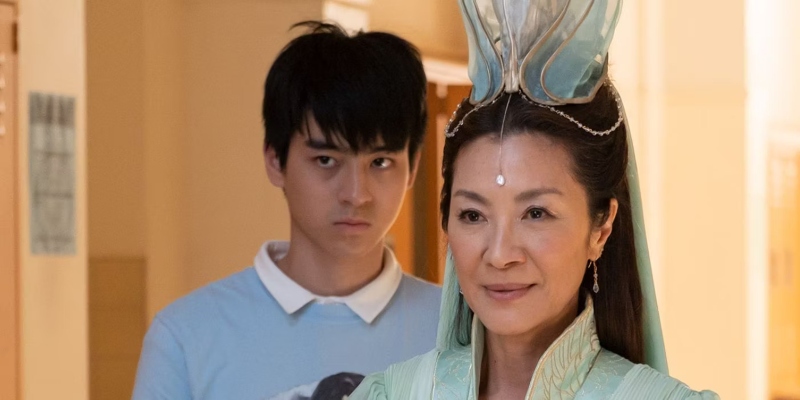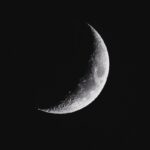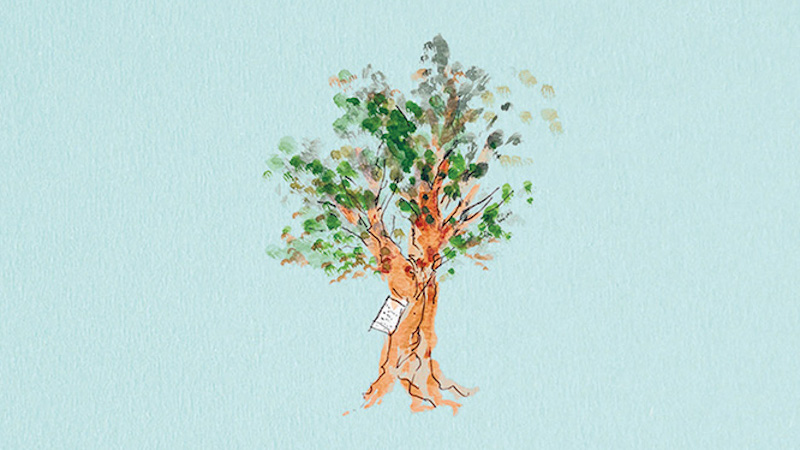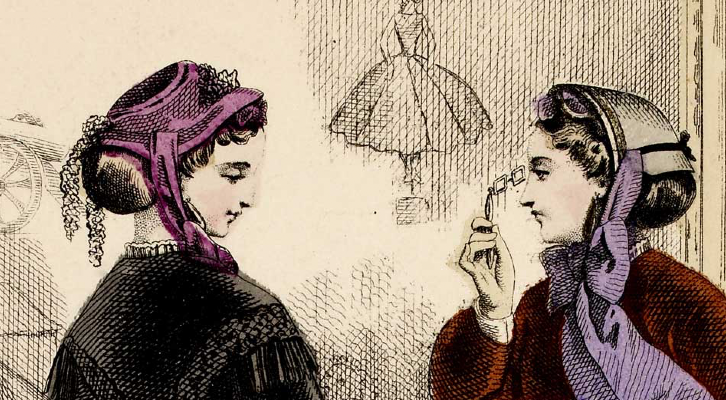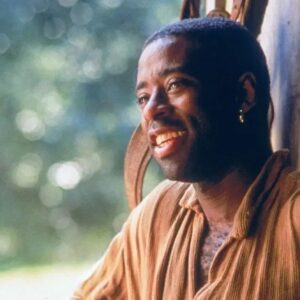Indulging in the Lightness of American Born Chinese is Like Escaping Into a World We Haven’t Built Yet
Yao Xiao on the Disney+ Adaptation of Gene Luen Yang’s Graphic Novel
Watching the new TV adaptation of Gene Luen Yang’s graphic novel American Born Chinese on Disney+, I feel like one of the Chinese immortals in the show who emerges from his den in the basement of a dim sum restaurant: it is as if several lifetimes have passed since I first experienced this story, when I was still a teenager from China, learning to live in America.
The show opens like an action movie based in ancient China: in a fantastical landscape with blazing red foliage, the powerful deity Sun Wukong chases his son. Before the reason for their fight is fully revealed, the scene shifts to another family, one that does not fly or wield magic: high schooler Jin Wang tries to escape his mother, who insists on buying him clothes that he does not like, in a dreary discount store that looks unmistakably suburban American.
The series moves between the realms of heaven and the American suburb, quickly establishing Jin’s dilemma: he is ready to grow up, but he doesn’t know what kind of person he is. He is torn by the choices that seem binary to him: whether he should join the soccer team or the cosplay club, be a jock or a nerd, act American or Asian. As the series moves forward with its multiple storylines and complex relationships between its characters, Jin continues to contemplate his choices and figure out who he is.
Bringing a colorful pantheon of Chinese folklore heroes, the show looks, sounds, and feels like a reunion of long-separated genres of Asian and Asian American cinema. Family drama flickers in and out of action-packed Hong Kong kung fu movies and Chinese fantasies with nonsequitur humor, creating a soundscape and visual collage that feel familiar in the Asian American experience.
When Gene Luen Yang published American Born Chinese in 2006, I was 16 years old. In the graphic novel, which I read a year into moving to the United States, three characters move in seemingly unrelated storylines toward an ultimate confrontation. First there is Sun Wukong, a mythical Chinese god who is denied entry to a celestial dinner party; then we meet Chinese American kid Jin Wang, who must face everyday racism when he is plucked from his childhood in San Francisco Chinatown and moved to the suburbs with his parents; and, at last, there is Cousin Chin-Kee, a walking embodiment of anti-Chinese stereotypes who shows up to an American high school and embarrasses his cousin, Danny, who appears to be an athletic white boy.
The three characters come together in an imaginative and subversive twist: Sun Wukong comes to America and presents himself in the form of Chin-Kee, an outcast and a pariah, to teach Jin a lesson: as an Asian person in America, self-acceptance is a difficult task and a test for the soul.
Compared to the triangulation between the Monkey King, Jin, and Chin-Kee in the graphic novel, the TV series focuses more on a one-to-one comparison between Jin (Ben Wang) and the much-expanded character Wei-chen (Jim Liu), the runaway son of Sun Wukong who needs Jin’s guidance to complete his quest on Earth.
The main tension in the show is simplified into two competing attitudes regarding being an outsider: whether to use your voice and fight for what you want, or to cave into self-doubt and become a brooding monster who hurts people around you. Whereas the original comic lacked a main villain, the show creates Bull Demon King (Leonard Wu), who plots to destroy Heaven and Earth after being rejected by heavenly authority, a metaphor and a warning for the consequences of not standing up for yourself.
As in the comic, the show places considerable weight on a visitor, who both looks like Jin and is very different from him. A visitor from the home country is a recurring motif in Asian American literature: oblivious of American culture and its systems, these visitors can raise important questions about preconceived notions around America. But in Yang’s graphic novel, things go beyond culture shock. Here, the dreaded visitor, Cousin Chin-Kee, wears a skullcap, long braid, and kung fu slippers, his skin yellow and eyes slanted. He salivates when he gets too excited about “Amellican girls.” He is the ultimate Bogeyman for any American Born Chinese, the specter that follows you around if you are Asian in America.
When I first encountered Cousin Chin-Kee, I was shocked at the blatant stereotypes, but I also felt seen. As a newcomer in America, I felt the same alienation that Jin and his friends were affected by, and yet few resources told me that the difficulties I contended with were more than just cultural differences. By referencing the 19th-century caricature connected to the Chinese Exclusion Act, Yang links Jin’s experience directly to the historical root of racism.
This approach was radical. It was painful to contend with at first, but it also felt cathartic: Cousin Chin-Kee disgusts, fascinates, and impresses his white high school classmates with his Chinese takeout that contains cat gizzards and his unbelievable ability to excel in every subject in school. He presents a moral conundrum to Jin: that as a person of Chinese descent, this is how he is seen in America; and as an American Born Chinese, Jin has to make a decision about whether to accept or reject the Chinese part of himself.
As a writer, I find it difficult to accept that we must choose between positivity and trauma.In the TV series, Cousin Chin-Kee’s storyline is dropped. Instead, we spend most of the time admiring a new student shadowing Jin for the semester: Wei-chen is tall, well-spoken, caring, loyal, smart, tough, stylish, handsome, bilingual, good at bowling, and also knows kung fu. Above all, he is confident. He doesn’t question who he is. With Wei-chen, the adaptation shifts away from the negative impacts of racism and toward a model for the newly empowered transnational: someone who has a witty remark for every microaggression, someone who doesn’t doubt who they are, someone who does not have to sacrifice their integrity to fit in.
As for Chin-Kee, the racial caricature that gave the original graphic novel its edge, the show makes an intriguing choice in creating a new character in his stead: Jamie Yao (Ke Huy Quan), a former actor who rose to fame for playing a character named Freddy Wong in a fictional sitcom. A reader of the graphic novel can tell that Freddy is a lot like Chin-Kee: modeled after Hollywood stereotypes like Long Duk Dong in 16 Candles, Freddy is just as cringeworthy, a clueless buffoon who speaks terrible English and is physically abused to slapstick effect in every episode, only to appear gleeful again in the next one.
Freddy softens the story considerably, but the realism of his role is almost more painful to watch. It is the show’s solution (with Gene Luen Yang’s consent) to address racism but keep it focused on Hollywood’s race problem, and in doing so avoid any misreadings or controversy around Chin-Kee, whose image, out of context, would be the visual equivalent of a racial slur.
While the graphic novel depicts the weight of racialized alienation on a daily basis—such as a scene where two white boys call Jin and his Asian friends“c****,” leaving the children silent with shame—the adaptation approaches tense moments with lightness, often providing the viewer with quick relief in the form of a witty quip or a mischievous eye roll in response to a microaggression.
Dazzling martial arts choreography enlivens the endless American high school hallway and the oppressive hierarchy it represents, repainting it as just another backdrop for a fight between Chinese gods, and a warm, nostalgic musical score that resembles Wong Kar Wai’s In The Mood For Love reminds us that the tenderness of a crush is a part of the Asian American experience, too.
As the show goes on, different characters from Chinese folklore show up disguised as everyday immigrants, like a jewelry shop owner (Stepahnie Hsu), an eccentric artist (Ronny Chieng), and an auntie (Michelle Yoeh). All of them exude confidence like Wei-chen: they travel through American society seemingly unscathed by the daily grind, armed with hidden powers and an unlimited pass between the suburbs and the celestial realm. Together, they weave an alternative world: a utopia where Asianess operates on its own rules.
On screen, they rarely share the frame with the American side of the cast; they arrive through a vortex in the sky and live in corners out of sight. It is curious that only the immortals have the power of confidence, the source of which would be extremely helpful on Earth. For now, the closest thing to that magical ability in the real world might be generational wealth, like the global-trotting elites of Crazy Rich Asians.
Together, they weave an alternative world: a utopia where Asianess operates on its own rules.The vortex doubles as a time warp, a reconciliation with all that has been lost—decades of Asian dramas, pop music, manga, and cosplay, for years relegated to the margins of foreign films and subculture, finally being acknowledged by mainstream entertainment in the United States. An iridescent crowd scene that shows the celestial gathering of the gods calls to mind the 1993 campy cult classic The Eagle Shooting Heroes and the Chinese CCTV’s 1986 TV adaptation of Journey to the West. At times, loving the references feels like willful indulgence: in the idea that accepting the Asian American community hinges only on a proper catching-up of Asian culture, that if white teenagers appreciate Panda Express and Dance Dance Revolution that must mean the world is smaller than we think.
The new narrative of the show is this: believe in yourself. Forget being exceptional, forget being likable, forget race, forget that you are on Earth, in America. Cultivate an effortless confidence and appear to be completely agnostic of place, live in a picture-perfect fantasy where faith in your friends and the right knowledge of pop culture is enough to save the world—a tempting vision I’m not entirely on board with yet, but one that feels buoyant and indulgent, like hanging out with family who tells you what you want to believe, even though you know the truth is far off.
I’m torn between feeling hopeful about the show and feeling disappointed that the creators missed an opportunity to creatively and radically address the long history of racializing Asian Americans. There is so much potential in adapting edgier stories for Asian Americans: the genre of horror, for example, would be well-suited for Chin-Kee’s clearly sinister but campy character, and there is a wealth of Asian thrillers to meld with. As a writer, I find it difficult to accept that we must choose between positivity and trauma, and that compromise is the only way to reach a bigger audience.
When I finished watching the series, it was late at night; I wished that the next morning, I would wake into a world like the one in the show, where I am not from China but an immortal drifted down through a vortex in the sky, where I just need to believe in myself more and not care so much about what other people think. I wanted to try cultivating an impervious confidence separated from race, but I couldn’t shake the feeling that it would be a mistake.
American Born Chinese—the series—is an escape into a world we are trying to build, but have not built yet. Racism will not be resolved by magic, and Asian Americans old and young still live in a fragile place where we must find a way to exist without compromising our truths, every day a tenuous test for the soul.

